Programs
Faculty of Social Sciences provides education by offering various curriculums in the Degrees of Arts and Sciences.
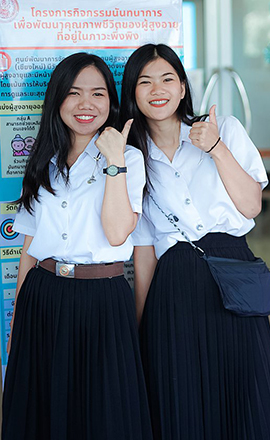
Undergraduate Degree

Graduate Degree

Doctoral Degree
CAREER PATHS
After graduation, students are qualified to pursue the following career paths: researchers, psychologists, historians, civil servants, policy and planning analysts, documentary writers, documentary reporters, political news reporters, military and police officers, diplomats, and public relations officers. The students can also pursue their academic goals at higher levels.
Undergraduate Degree
Bachelor of Science (Psychology)
The field of Psychology is the scientific study of overt and covert behavior to be able to
understand and modify human behavior. The purpose of the course is to produce graduates who can apply knowledge to clinical and organizational work related to psychology.
What is Psychology?
Psychology studies the scientific processes of the mind, thoughts, and behaviors of human beings
What does Psychology focus on?
BS Psych focuses on students’ understanding of themselves and others by using psychological processes to prevent, treat, develop and create human mental health including research and developing psychological innovations
How many years?
4 years
What are you going to do after graduation?
- Psychologist
- Personnel Development Officer
- Guidance Counselor and Teacher
- Various self-employment opportunities
- Other related professions
- Further postgraduate studies (Masters and Doctorate degrees)
Bachelor of Arts (History)
What is History?
History is the systematic study of surviving pieces of evidence from the past, which links our present and future
What does History focus on?
BA History focuses on students’ knowledge and understanding of diverse historical subjects correctly and precisely and meeting the needs of various learners who wished to be a professional historian or other applicable fields and occupations
How many years?
4 years
What are you going to do after graduation?
- Teacher
- Guide
- Historian
- Journalist / Playwright
- Document researcher / Field researcher
- Various self-employment opportunities
- Other related professions
- Further postgraduate studies (Masters and Doctorate degrees)
Bachelor of Arts (Social Development)
What is Social Development?
Social Development is a study on how society can change for the better and progress in terms of politics, economy, society, and culture
What does Social Development focus on?
BA SocDev focuses on facilitating the learners’ knowledge in various developments with care and consistency with the Thai society’s way of life, changes and development in their readiness to public service, and skilled in RAP – Research, Academic, and Social Practice
How many years?
4 years
What are you going to do after graduation?
- Social Development Worker
- Policy and Planning Section Officer
- Various business organizations
- Various self-employment opportunities
- Other related professions
- Further postgraduate studies (Masters and Doctorate degrees)
Bachelor of Political Science
What is Political Science?
Political science is a science that studies politics, governing political processes, political institutions, and various transpiring political phenomena
What does Political Science focus on?
BS PolSci focuses on producing academically excellent future leaders in political science and public administration who are responsible, virtuous, and ready to serve the country’s demands with excellent skills in conducting quality Political Science researches
How many years?
4 years
What are you going to do after graduation?
- Government Officers
- Private agencies
- Local Administrative Organization
- An independent organization
- International organizations and embassies
- Educational institution
- Further postgraduate studies (Masters and Doctorate degrees)
- Other related professions
Bachelor of Arts Program in Global Studies (Bilingual Program)
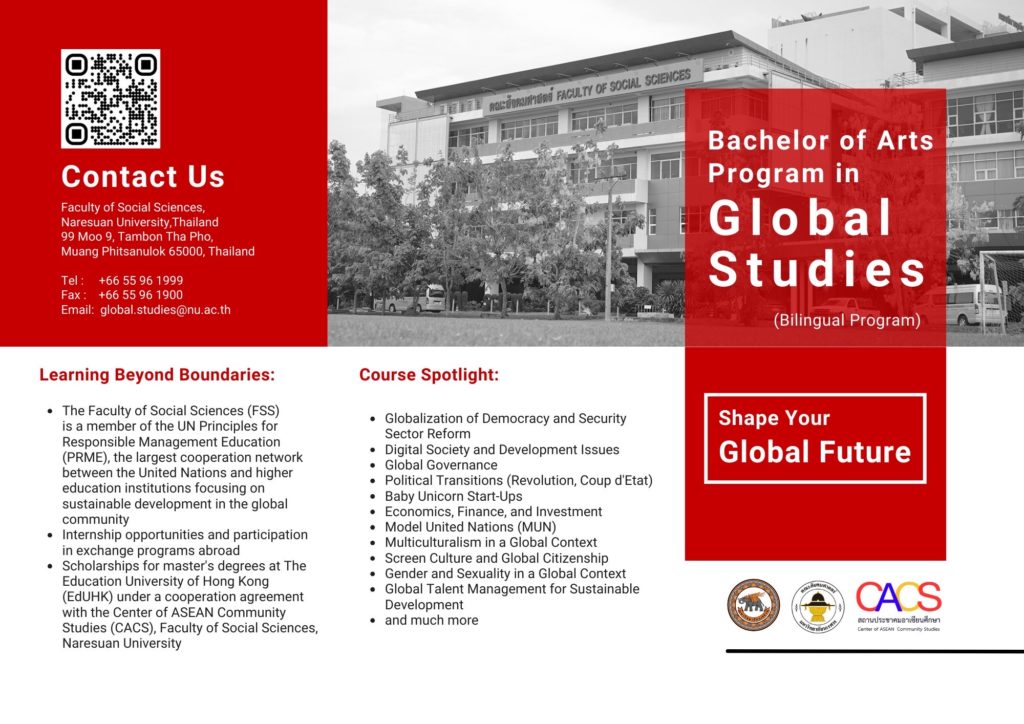
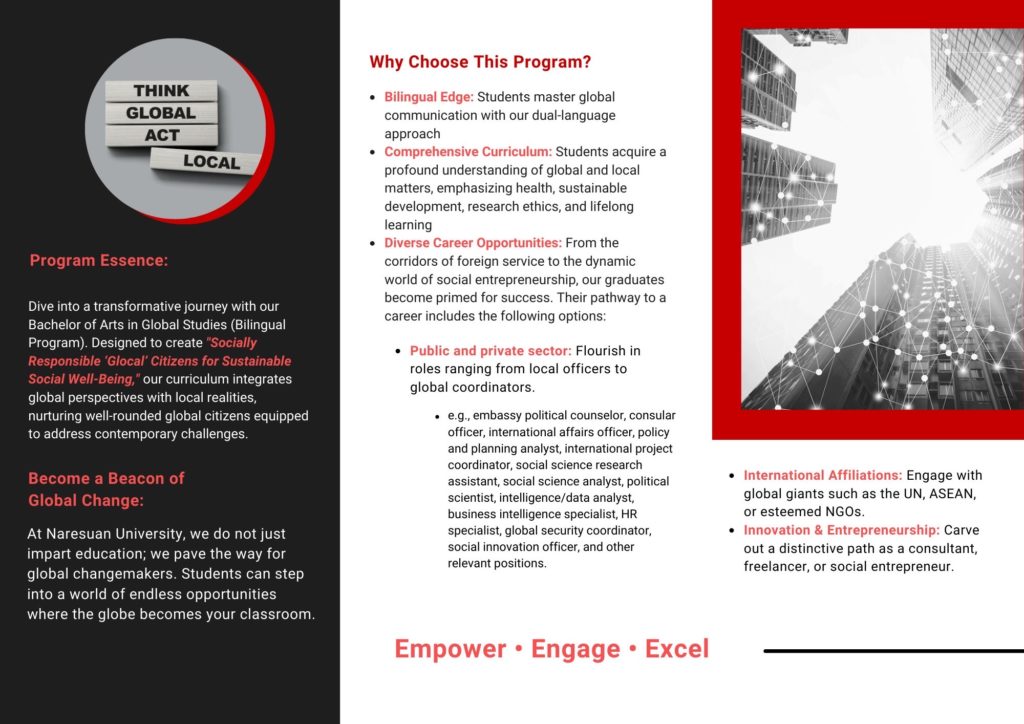
GRADUATE DEGREE
Master of Arts (ASEAN Studies)
PROGRAM STRUCTURE I: Master of Arts Program in ASEAN Studies (2 years)
Master Program (Thesis)
- Thesis 12 credits +
- Coursework 24 credits
Master Program (IS)
- Independent Study 6 credits +
- Coursework 30 credits
PROGRAM STRUCTURE II:
1 + 1 Master Programs: Master of International Relations and Development, Education University of Hong Kong and Master of Arts Program in ASEAN Studies, The Faculty of Social Sciences, Naresuan University, Thailand
English Language Requirements :
A minimum English proficiency score: either a TOEFL (internet -based) score of at least 46, an IELTS (Academic) score of 5.5, or other English proficiency scores accepted by Naresuan University
Supporting Documents:
- Statement of purpose (500 – 1,000 words)
- Research proposal (2,000-3,000 words)
- Two letters of recommendation (at least one from an academic institution and one from a former/current affiliation)
- Curriculum Vitae
Graduation Requirements:
- 1 Research publication
- 1 Research presentations
- 80% Class attendance
Applicants must hold a bachelor’s degree level in the social sciences or other relevant fields from an institution approved by the Office of the Higher Education Commission of Thailand
- Research Methodology in Social Sciences
- Development and Cooperation of the ASEAN Community
- Border Studies in ASEAN
- Human Security and Sustainability in Southeast Asia
- Mixed Methods Research (Non-counted Credit Course)
- Concepts and Theories in International Development
- ASEAN Community and Regional Security
- Policy Design, Policy making and Development Strategy
- ASEAN Community in Multicultural Studies
- Economic Growth, Development, and Civil Society in ASEAN
- Agricultural Development and Food Security in ASEAN
- Gender Equity and Sustainability
- Cinema, Cultural Studies and the ASEAN Community
- Development in East Asia
- Comparative Urban Development in Asia
- Public Health and Policy Analysis in Developing Societies
- Experiencing Developing Societies: Field Work
- Institutions and International Relations
1 + 1 Master Programs (2 years, 2 Universities, 2 Countries and 2 Master Degree Certificates)
- 1st year: Master of International Relations and Development at the Education University of Hong Kong
- 2nd year: Master of Arts Program in ASEAN Studies at the Faculty of Social Sciences, Naresuan University, Thailand
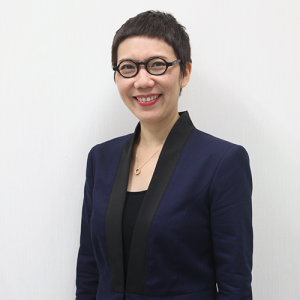
Course President
Assist. Prof. Dr. Napisa Waitoolkiat
Course responsible person
- Assist. Prof. Dr. Napisa Waitoolkiat
- Honorary Assist. Prof. Dr. Katsuyuki Takahashi
- Dr.Atit Pongpanit
- Dr. Paul Wesley Chambers
Master of Arts (Southeast Asian Studies)
The graduate program in Southeast Asian Studies at Naresuan University is an area-based interdisciplinary program, covering in multiscale of thought-system, philosophy, civilization, history, economics, politics, society, culture, ethnicities, language, environment, etc.
The Southeast Asian studies program aims to be a centre for Southeast Asian research producing skilled and in-depth researchers and new bodies of knowledge related to the ASEAN Community and the Southeast Asian region. The program aims to:
- Develop the human resources in research on the ASEAN Community and the Southeast Asian region that engaged with the educational and developmental policies of the country
- Develop the interdisciplinary knowledge and research on the ASEAN Community and the Southeast Asian region, on both national and international interests
- Connect with the Southeast Asian studies network, both with national and international agencies
Our comparatively small incoming classes allow for close relationships with faculty, as well as individually tailored courses of study. Our graduate students also receive opportunities to teach, both as TAs and on their own at Naresuan University and other colleges and universities.
- Creating new interdisciplinary research on Southeast Asian studies and the ASEAN Community
- Strengthening the academic network in Southeast Asia and the academic exchange among Southeast Asianists across the academic world
- Developing information resources and the collection for Southeast Asian researches at Naresuan University
- Good Governance
- Public Policy
- Local Politics
- Southeast Asia
- The State of Southeast Asian Studies
- Theories and Concepts in Pre-modern Southeast Asia
- Theories and Concepts in Modern Southeast Asia
- Cultural and Social History in Southeast Asia
- Economic Geography in Southeast Asia
- Contemporary Politics in Southeast Asia
- Religious Movements in Southeast Asia
- World Heritage and Museum in Southeast Asia
- Creative Tourism in Southeast Asia
- Popular Culture in Southeast Asia
- Contemporary Literature in Southeast Asia
- Special Topics in Southeast Asian Studies
Master of Arts (Social Development)
This program aims to develop analytical and theoretical skills by providing various social research methodologies to postgraduate students and lecturers, bringing to the classroom enthusiasm of their disciplines and their considerable research expertise. This combination ensures that the latest ideas and insights of the disciplines are immediately available to our students, providing a refreshingly creative academic environment for interactive learning. In order to encourage learning from local experiences and promote civic participation in managerial social resources and capitals, we encourage our students to search for new methodologies and strive for the promotion of sustainable development based on the security of local livelihoods through the participation of the community. Research topics focus on, among other things, local knowledge, sustainable development, health, and gender.
Learners in this program are expected to possess:
- Skills to promote participation in all sectors while being generous in listening to opinions from all levels and coordinating policymakers into action for social development
- Ability to apply knowledge from research in solving spatial problems by designing strategic planning for social development administration to have a concrete solution consistent with the context of Thai society and culture
- Effective managerial and organizational skills in keeping up with the changing situations of the world society aided by technology while promoting social responsibility
- Expertise in resource management while ensuring equitable social development despite limited conditions
- Social Development
- Project Management
- Social Policy Implementation
- Area-based Issues
- Strategic Designing and Planning
- Sustainable Development
- Sociological and Anthropological Theories
- Social Development Theory
- Strategic Designing and Planning
- Social Development Administration
- Social System Analysis
- Public Consciousness,Contemporary Issues and Development Trends
- Theory and Evaluation on Impact from Development
- Sociology and Anthropology of Development
- Capacity Building for Group, Organization and Community
- Development Tools and Techniques
- Public Policy on Development
- Development Policy toward Social and Cultural Change
- Population, Society and Development
- Substantive Social Development
Master of Political Science
The department offers two programs: (1) for students pursuing academic excellence, and (2) for government officials and public or private sector employees who are exploring administration theories and techniques relevant for their professional development and career paths. Graduates from our department, for nearly over ten years, have been employed in various organizations in both the public and private sectors.
Learners in this program are expected to possess:
- Ability to implement the concepts and theories of political science in politics, governance, public administration, and international relations
- In-depth knowledge to explain and analyze the relevance of politics at national and international levels – economically and socially
- Academic research skills in the field of political science
- Moral awareness, academic ethics, good governance and social responsibility in Thai politics
- Social and Cultural Histories
- Tourism and Cultural Management
- Pop Cultures in Southeast Asia
- Contemporary Politics in Southeast Asia
- The State of Southeast Asian Studies
- Theories and Concepts in Pre-modern Southeast Asia
- Theories and Concepts in Modern Southeast Asia
- Cultural and Social History in Southeast Asia
- Economic Geography in Southeast Asia
- Contemporary Politics in Southeast Asia
- Religious Movements in Southeast Asia
- World Heritage and Museum in Southeast Asia
- Creative Tourism in Southeast Asia
- Popular Culture in Southeast Asia
- Contemporary Literature in Southeast Asia
- Special Topics in Southeast Asian Studies
DOCTORAL DEGREE
Doctor of Philosophy (Southeast Asian Studies)
The doctoral program in Southeast Asian Studies offered by the Faculty of Social Sciences is the first and only one of its kind in Thailand.
Southeast Asia differs from other regions in the world because of being the hub of the ASEAN Economic Cooperation (AEC), actualized fully in 2015.
This program examines the region and the emergence of the ASEAN Community as its recent patterns derived from the integration of historical, economic, social, and cultural evolution. The main purpose is to identify the roots of the current citizens–the gateway to the genuine understanding of the peoples of Southeast Asia. By adequately sorting out the factors that shape ASEAN idiosyncrasies, best accomplished via comparative research drawing on both qualitative and quantitative methodologies prevalent in our doctoral students’ endeavors.
The program focuses on the interdisciplinary approach, targeting the Southeast Asian region as the “object of analysis.” The curriculum is aimed at graduate students from diverse disciplines who want to explore Southeast Asia in all dimensions as much as possible. The area of study covers mentalities or thinking systems, philosophies, civilizations, histories, economics, politics, societies, cultures, ethnographies, religions, languages, and environs.
Practice-led research overcomes divisions between social theory and action research, and between creative practice and evidence-based research. Students are encouraged to examine a range of undertakings and enable them to carry out studies on their own at an advanced level with integrative understanding.
Graduates will be endowed with expertise in the most up-to-date knowledge of Southeast Asian Studies, especially current issues in the development and possible solutions in the expansion of the body of knowledge in ASEAN, including systematic knowledge, as one distinctive advantage of this program.
In accordance with the Graduate School Rules and Regulations. The program committee reserves the rights to require more qualifications as deemed appropriate.
Thai and English
In accordance with the Graduate School Rules and Regulations
- Area Studies and the Disciplines: A Theoretical Exploration
- Key Contemporary Thinkers: From Structuralism to Postcolonialism
- The State of Southeast Asian Studies
- Theories and Concepts in Pre-modern Southeast Asia
- Theories and Concepts in Modern Southeast Asia
- Cultural and Social History in Southeast Asia
- Economic Geography in Southeast Asia
- Contemporary Politics in Southeast Asia
- Religious Movements in Southeast Asia
- World Heritage and Museum in Southeast Asia
- Creative Tourism in Southeast Asia
Popular Culture in Southeast Asia - Contemporary Literature in Southeast Asia
- Historiography and Subjectivity in Southeast Asia
- Cultural Commodification and Creative Economy in Southeast Asia
- Bodies and Border in Southeast Asia
- Human Ecology and Landscape in Southeast Asia
- Disease and Medicine in Southeast Asia
- Sexuality and Gender in Southeast Asia
- Buddhism in Contemporary Southeast Asia
- Special Topic in Southeast Asian Studies
- Identity and Roots of Ethnic Groups and Cultures
- Multidisciplinary Approach in the Evolution Histories
- Idiosyncrasies of economics and social systems unique in Southeast Asia.
Doctor of Philosophy (Social Development)
This program encourages the construction of new bodies of knowledge as well as the search for methodologies based on the dynamic interchange of diverse theories, paradigms, and philosophies. On knowledge production, the program strengthens students’ abilities in terms of systematic thinking and creative ideology concerning alternative development strategies such as sustainability, social equality, and security.
Participants of this program are expected to have the:
- Ability to think and analyze social systems, policies, and social impacts,
- High level of research capabilities to set strategies for social development,
- Creativity to apply knowledge for social innovation,
- Practical expertise to drive a society progressively with quality, and
- Skills to strengthen the networks of social development leaders, both local and international.
In accordance with the Graduate School Rules and Regulations. The program committee reserves the right to require more qualifications as deemed necessary.
Thai and English
In accordance with the Graduate School Rules and Regulations
- Philosophy in Social Sciences
- Contempory Concept and Theory in Social Development
- Policy, Planning and Strategy in Social Development
- Current Issues and Trends in Social Development
- Comparative Study of Social Development in Diverse Contexts
- Regional Studies in Social Development
- Capacity Building for Social Development
- Cultural Diversity and Living in a Pluralist Society
- Advanced Qualitative Research for Social Development
- Selected Topic for Developing a Concept Paper
- Systematic Policy Research
- Phronetic Social Research
- Sociology and Anthropology in Rural and Urban Studies
- Advanced Statistics for Social Sciences Research
Doctor of Philosophy (Political Science)
One of our department objectives is to maintain high academic standards requiring Faculty members to systematically provide and develop teaching materials for students in each course. In this program, students are strongly encouraged to participate in class. For passing each course, criteria include essay exams and written assignments based on independent researches using the analytical framework. Interns are required to meet academic requirements in preparation to join public or private organizations. Criteria for passing the internship program are excellent marks and performance from both intern supervisors of the department and supervisors at a public or private organization.
The department also continues to inspire students to think critically, be active, and ready to respond to the rapid changes in the economy, politics, and society. Graduates from our department are not only well-qualified individuals but also democratic citizens, maintaining a free and fair society.
Participants of this program are expected to have the:
- Profound research potential in political science, advancing new proposals for political science,
- Expertise in the latest developments of knowledge in the field of political science, especially on researches for the development and solution of significant problems of Thai political society,
- Ability to produce and develop a piece of new knowledge or content in political science to progress further at the international level, including systematic knowledge management in political science, and
- Awareness of academic ethics and morality as a political science scholar with good governance and responsibility to Thai society and politics.
In accordance with the Graduate School Rules and Regulations. The program committee reserves the right to require more qualifications as deemed necessary.
In accordance with the Graduate School Rules and Regulations
- Philosophy of Social Science and Political Analysis
- Politics and Public Policy
- Advanced Political Theory
- Advanced Political Economy
- Advanced Comparative Politics
- Advanced International Politics
- Advanced Security Studies
- Advanced Politics and Development
- Advanced Crisis and Disaster Management
- Advanced Public Finance
- Advanced Conflict and Peace Studies
Besides giving lectures, members of our department are regularly conducting researches in various areas according to their interests with grant sources provided by Naresuan University Research Fund, government budget, and financial support from government organizations and the private sector. Moreover, the department also interacts with domestic and international educational institutions for research collaborations and are generally used to support class lectures. Often, these researches are also used by policymakers and officials in public and private organizations to formulate policies and measures addressing their problems. Furthermore, each year, faculty members’ research papers are presented at both national and international conferences, usually published in journals and books.
Doctor of Philosophy (ASEAN Studies)
“GLOCAL SOCIETY”:
Fostering Locality and Forwarding Globality for a Sustainable Society
CACS is committed to advancing scholarship and research on issues related to the three pillars of ASEAN community: ASEAN Political-Security Community, ASEAN Economic Community, and ASEAN Socio–Cultural Community.
Innovation, internationalization, partnership, and policy-oriented research are our key work areas.
Ph.D. in Research program
- Dissertation 48 credits
Ph.D. in Coursework program
- Dissertation 36 credits +
- Coursework 12 credits
CACS seeks to admit the best students with the potential to make the most of our professional facilities and academic staff. In this section, you can find out the routes to apply to CACS and what to expect during this process. Beyond the university’s requirements, CACS also requires the following:
English Language Requirements :
A minimum English proficiency score: only either a TOEFL (internet-based) score of at least 60 or an IELTS (Academic) score of 6.0. These two scores are university requirements for obtaining the scholarship. However, CACS prefers either a TOEFL (internet-based) score of at least 79 or an IELTS (Academic) score of 6.5. Students who pass NU’s minimum English requirement but fail to meet CACS’s minimum English requirement must attend the English class provided free of charge by the NU Language Center until she/he receives the passing grade of level B2, according to the Common European Framework of Reference for Languages (CEFR).
Supporting Documents:
Ph.D. in Research program
- Statement of purpose (1,000 words)
- Research proposal (2,500 – 3,000 words)
- Two letters of recommendation (at least one from an academic institution and one from a former place of affiliation)
- Curriculum Vitae
Ph.D. in Coursework program
- Statement of purpose (1,000 words)
- Research proposal (1,500 – 2,000 words)
- Two letters of recommendation (at least one from an academic institution and one from a former place of affiliation)
- Curriculum Vitae
Graduation Requirements:
- 1 Research publication
- 2 Research presentations
- 80% of class attendance
- Pass the qualifying examination
- Interdisciplinary Research Methodology
- Perspectives on the Dynamics of ASEAN Community
Development and Sustainability - Advanced Techniques for Policy and Strategic Development
- Human Resource Development and Labor Competence in ASEAN
- Management in Natural Resources, Environment, and Energy in ASEAN
- Poverty and Inequality in ASEAN
- Governance and the Rise of Civil Society in ASEAN
- Transportation and Logistics Development in ASEAN
- Entrepreneurship in Creative and Knowledge-Based Economy
- Tourism Marketing and Sustainable Tourism Development in ASEAN
- Agricultural Development and Food Security in ASEAN
- Public Management and Public Service Delivery Enhancement in ASEAN
- ASEAN Community in Multicultural Context
- Economic Growth and Stability in ASEAN
- ASEAN Community and Regional Security
Applicant must hold a degree at the MSc/MA level in the social sciences or other relevant fields from an institution approved by the Office of the Higher Education Commission of Thailand.
We approach ASEAN issues through the framework of 3 different types of “capital,” pushed and pulled by forces both intrinsic and external to ASEAN and the region.
The Center of ASEAN Community Studies (CACS) hopes to equip our students with the knowledge and conceptual tools to understand the consequences of connectivity for ASEAN—and the wider world.
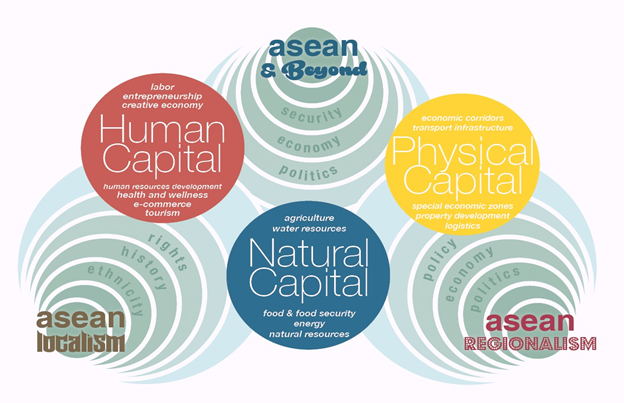

Course President
Assist. Prof. Dr. Napisa Waitoolkiat
Course responsible person
- Assist. Prof. Dr. Napisa Waitoolkiat
- Honorary Assist. Prof. Dr. Katsuyuki Takahashi
- Dr.Atit Pongpanit
- Dr. Paul Wesley Chambers